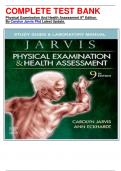COMPLETE TEST BANK
Physical Examination And Health Assessment 9th Edition
By Carolyn Jarvis Phd Latest Update.
, Table Of Contents
Table Of 1
Contents
Chapter 01: Evidence-Based Assessment 2
Chapter 02: Cultural Competence 15
Chapter 03: The Interview 31
Chapter 04: The Complete Health History 49
Chapter 05: Mental Status Assessment 64
Chapter 06: Substance Use Assessment 81
Chapter 07: Domestic And Family Violence Assessments 87
Chapter 08: Assessment Techniques And Safety In The Clinical 93
SettingChapter 09: General Survey, Measurement, Vital Signs 112
Chapter 10: Pain Assessment: The Fifth Vital Sign 134
Chapter 11: Nutritional Assessment 142
Chapter 12: Skin, Hair, And Nails 156
Chapter 13: Head, Face, And Neck, Including Regional 177
LymphaticsChapter 14: Eyes 195
Chapter 15: Ears 212
Chapter 16: Nose, Mouth, And Throat 229
Chapter 17: Breasts And Regional 247
LymphaticsChapter 18: Thorax And Lungs 267
Chapter 19: Heart And Neck Vessels 285
Chapter 20: Peripheral Vascular System And Lymphatic 304
SystemChapter 21: Abdomen 321
Chapter 22: Musculoskeletal System 338
Chapter 23: Neurologic System 359
Chapter 24: Male Genitourinary System 384
Chapter 25: Anus, Rectum, And 402
Prostate 416
Chapter 26: Female Genitourinary System 438
Chapter 27: The Complete Health Assessment: Adult 451
Chapter 28: The Complete Physical Assessment: Infant, Child, And 454
AdolescentChapter 29: Bedside Assessment Of The Hospitalized Patient 460
Chapter 30: The Pregnant Woman 473
Chapter 31: Functional Assessment Of The Older Adult
,Chapter 01: Evidence-Based Assessment
Multiple Choice
1. After Completing An Initial Assessment Of A Patient, The Nurse Has Charted That His Respirations Are
Eupneic And His Pulse Is 58 Beats Per Minute. These Types Of Data Would Be:
a. Objective.
b. Reflective.
c. Subjective.
d. Introspective.
Ans: A
Objective Data Are What The Health Professional Observes By Inspecting, Percussing, Palpating, And
Auscultating During The Physical Examination. Subjective Data Is What The Person Says About Him Or
Herself During HistoryTaking. The Terms Reflective And Introspective Are Not Used To Describe Data.
Dif: Cognitive Level: Understanding (Comprehension) Ref: P. 2
Msc: Client Needs: Safe And Effective Care Environment: Management Of Care
2. A Patient Tells The Nurse That He Is Very Nervous, Is Nauseated, And Feels Hot. These Types Of Data Would Be:
a. Objective.
b. Reflective.
c. Subjective.
d. Introspective.
Ans: C
Subjective Data Are What The Person Says About Him Or Herself During History Taking. Objective Data Are
What The Health Professional Observes By Inspecting, Percussing, Palpating, And Auscultating During The
Physical Examination. The Terms Reflective And Introspective Are Not Used To Describe Data.
Dif: Cognitive Level: Understanding (Comprehension) Ref: P. 2
Msc: Client Needs: Safe And Effective Care Environment: Management Of Care
3. The Patients Record, Laboratory Studies, Objective Data, And Subjective Data Combine To Form The:
a. Data Base.
b. Admitting Data.
, c. Financial Statement.
d. Discharge Summary.
Ans: A
Together With The Patients Record And Laboratory Studies, The Objective And Subjective Data Form The
Data Base. The Other Items Are Not Part Of The Patients Record, Laboratory Studies, Or Data.
Dif: Cognitive Level: Remembering (Knowledge) Ref: P. 2
Msc: Client Needs: Safe And Effective Care Environment: Management Of Care
4. When Listening To A Patients Breath Sounds, The Nurse Is Unsure Of A Sound That Is Heard. The
Nurses Next Action Should Be To:
a. Immediately Notify The Patients Physician.
b. Document The Sound Exactly As It Was Heard.
c. Validate The Data By Asking A Coworker To Listen To The Breath Sounds.
d. Assess Again In 20 Minutes To Note Whether The Sound Is Still Present.
Ans: C
When Unsure Of A Sound Heard While Listening To A Patients Breath Sounds, The Nurse Validates The Data To
Ensure Accuracy. If The Nurse Has Less Experience In An Area, Then He Or She Asks An Expert To Listen.
Dif: Cognitive Level: Analyzing (Analysis) Ref: P. 2
Msc: Client Needs: Safe And Effective Care Environment: Management Of Care
5. The Nurse Is Conducting A Class For New Graduate Nurses. During The Teaching Session, The Nurse
Should Keep In Mind That Novice Nurses, Without A Background Of Skills And Experience From Which To
Draw, Are More Likely To Make Their Decisions Using:
a. Intuition.
b. A Set Of Rules.
c. Articles In Journals.
d. Advice From Supervisors.
Ans: B
Novice Nurses Operate From A Set Of Defined, Structured Rules. The Expert Practitioner Uses Intuitive
Links. Dif: Cognitive Level: Understanding (Comprehension) Ref: P. 3




